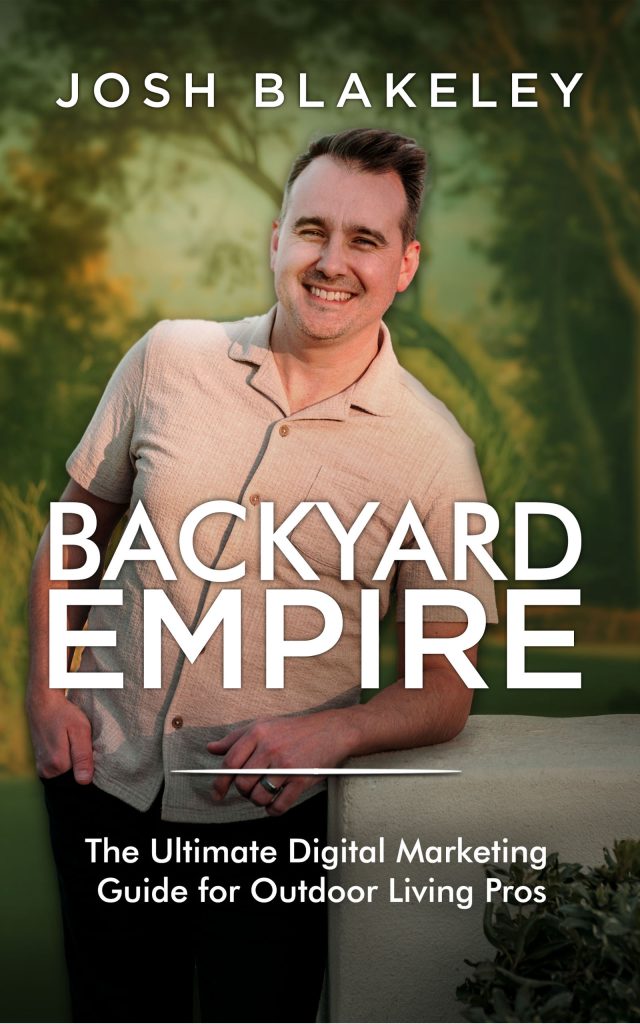Hello — I’m Josh Blakely, founder and CEO of Landscape & Hardscape Contractor Marketing. I created this in-depth guide to help landscape and outdoor living contractors understand how AI is reshaping search, what Answer Engine Optimization (AEO) means for your business, and the practical steps you can take today to make sure your company gets found. If you focus on landscape marketing, this guide will help you future-proof your lead generation and sharpen your reputation online.
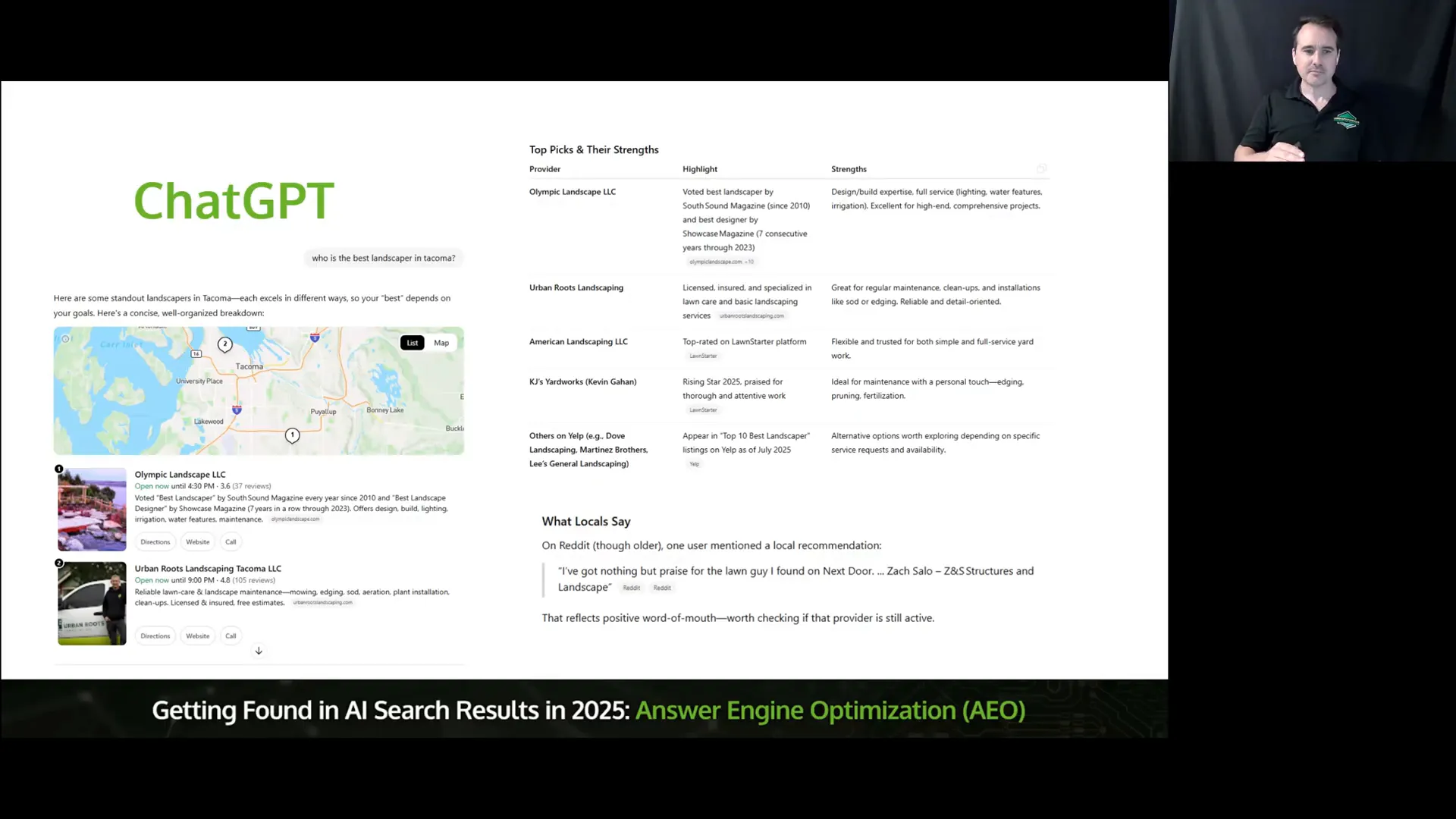
In this article, I’ll walk through why traditional SEO still matters, how it intersects with AEO, and the exact tasks you should prioritize for local visibility. I’ll also share how to use short-form video, consistent listings, and structured data to build a brand that AI and customers trust. Throughout this piece, I’ll call out tactical checklists you can implement right away to improve your landscape marketing outcomes.
Table of Contents
- Outline: What You’ll Learn
- Introduction to AI in Search Results (Why This Matters for Landscape Marketing)
- Understanding AI Search and Its Impact
- The Shift from SEO to AEO: What Changes and What Still Matters
- How Customers Are Using AI for Search
- Branding and Its Importance in AI Search
- The Role of Listings and Reviews: Your Reputation System
- Website Optimization for AI Search: SEO Meets AEO
- The Rise of Short-Form Video in Search (AEO’s New Frontier)
- Putting It Together: A Practical 9-Step Action Plan for Landscape Marketing and AEO
- Examples and Real-World Scenarios
- Measurement: How to Know AEO Is Working
- Common Mistakes to Avoid
- Tools and Resources I Recommend
- Conclusion: Start Small, Build Consistency, Play the Long Game
- FAQs — Answering the Most Common Questions About AEO and Landscape Marketing
- Final Checklist: 15 Quick Wins for Landscape Marketing and AEO
Outline: What You’ll Learn
- Why AI search matters for landscape marketing and local service businesses
- Differences between SEO and AEO — and how to run both together
- How customers are changing search habits and what that means for your marketing
- Branding elements that AI looks for and how to present them online
- Listing, review, and citation strategies to boost reputation and search presence
- Website optimization, schema, and content structure tips aligned with AI
- Why short-form video matters and how to get started efficiently
- Actionable checklists, examples, and an FAQ to get you moving
Introduction to AI in Search Results (Why This Matters for Landscape Marketing)
AI search engines and conversational assistants have moved from novelty to everyday tools. For anyone in landscape marketing, that means the way leads find you is shifting quickly. No longer is it enough to only “rank” on page one in the classic sense — AI platforms synthesize, summarize, and surface businesses using multiple signals beyond a single website’s keyword match. They pull from directories, reviews, social posts, and even Reddit threads to answer a user’s question. That is why you need to treat your digital presence as a system, not just a single ranking page.
Think about how you search now. You may ask a conversational assistant for a recommendation: “Who’s the best patio builder near me?” That assistant returns a short list, often with little detail, and supports its answer with references. Those references come from your Google Business Profile (GBP), Yelp, third-party directories, news articles, social media, and — increasingly — short videos. This is the playing field for landscape marketing in 2025.
Understanding AI Search and Its Impact
AI search platforms like ChatGPT (with browsing enabled), Google Gemini, Perplexity, and other LLM-powered assistants have one big capability that changes everything: they aggregate and cite multiple sources when answering. That aggregation makes reputation and distributed content more important. If your name, address, phone number, and brand messaging are scattered or inconsistent, AI has less confidence in recommending you.
Here’s what I see happening right now in landscape marketing:
- AI references multiple sources in its answers. It will list your website, your directory profiles, and sometimes social posts or forum mentions as supporting references.
- AI favors clarity and uniqueness of brand messaging. What makes you different needs to appear consistently across channels.
- AI displays short media — notably short-form videos — directly in search results more often than before.
- Local citation consistency (NAP: name, address, phone) is re-emerging as a strong signal because AI pulls from multiple directories.
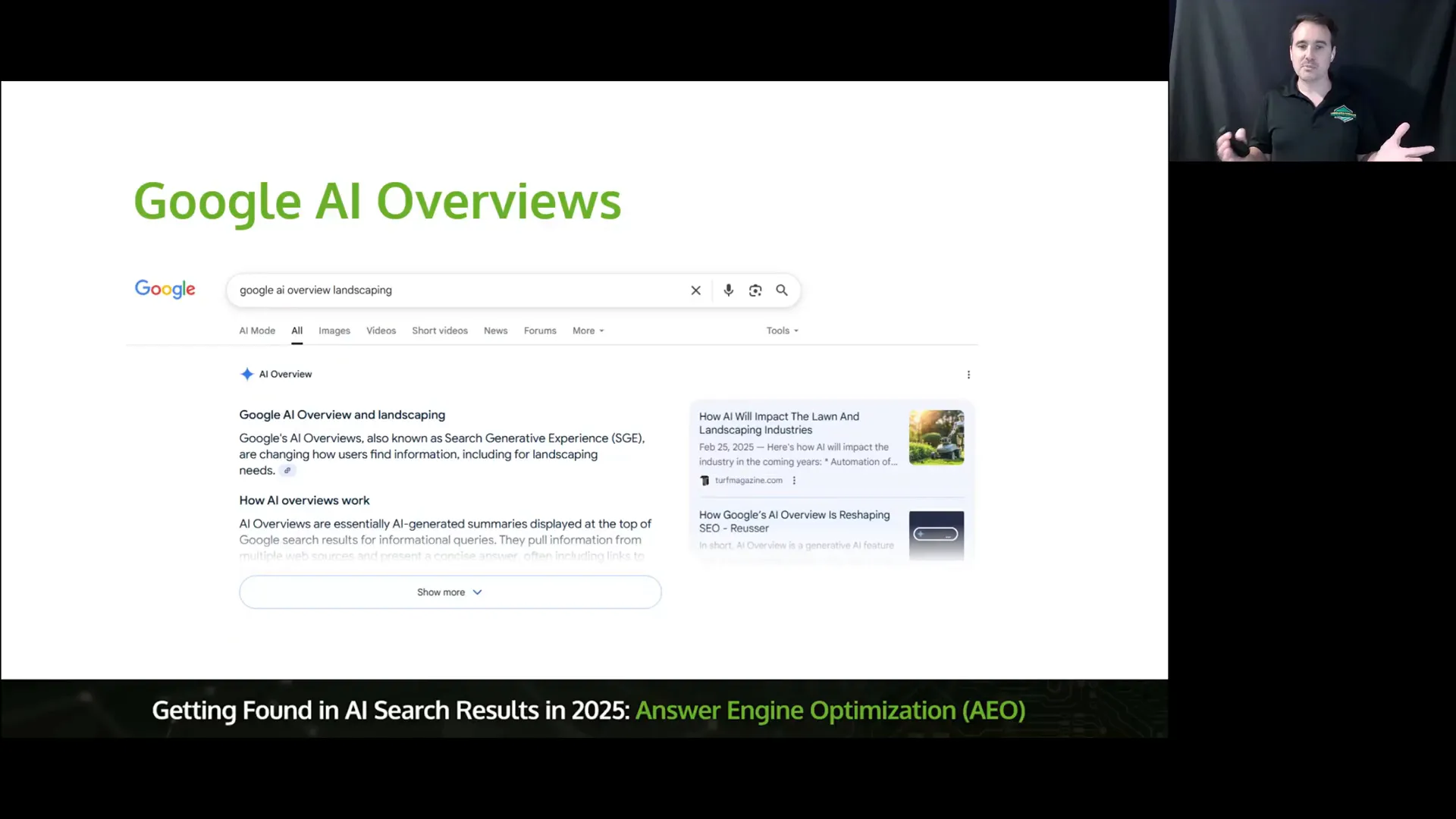
These shifts mean that landscape marketing strategy must be multilayered: keep classic SEO on your site, but add targeted AEO work that ensures your business is referenced accurately and often across the web.
The Shift from SEO to AEO: What Changes and What Still Matters
Let’s be clear: search engine optimization (SEO) is not dead. Your website still needs strong on-page content, optimized service and location pages, and off-page links. What’s different is the way AI analyzes those signals; that’s where answer engine optimization (AEO) comes in. AEO is essentially the process of optimizing your presence so AI assistants choose your business in their answers.
Key differences for landscape marketing:
- Keywords still matter, but intent and specificity matter more. Instead of “landscaping Tacoma,” users ask more detailed questions like “best landscaping company for drought-tolerant designs in Tacoma” or “patio contractors near me who offer free on-site consults.”
- Brand signals now weigh heavily in many AI systems. A recognizable, consistent brand across websites, social, and directories makes AI more likely to pick you.
- Distributed trust signals — reviews on multiple platforms, mentions on Reddit/Nextdoor, current content — all influence AI picks.
- Structured data (schema) helps AI understand your site content more reliably than raw keywords alone.
For a landscape marketing program, that means running SEO and AEO together — on-page optimization, plus off-page reputation building and consistently distributed content for the AI systems to reference.
How Customers Are Using AI for Search
Customers are increasingly comfortable asking an AI assistant for recommendations. Many will follow up by clicking the sources cited, while others will use the AI’s summary as the final decision. Here are the behaviors we’ve seen relevant to landscape marketing:
- Conversational queries: People ask natural-language questions instead of short keywords. This increases the importance of answering common customer questions clearly on your site and in other places that the AI can read.
- Trust in citations: When AI cites your Google Business Profile, Yelp, or a local forum post, that citation acts like social proof. If you’re not present or accurate on those platforms, you lose the chance to be cited.
- Multimodal consumption: Customers might see a short video in the search results and decide before visiting a website. A short video gives a massive advantage for conversion.
- Local nuance matters: Customers expect AI to know your service area, specialties, and availability (free consults, seasonal scheduling windows). If that information isn’t visible across your digital footprint, AI can’t present it confidently.
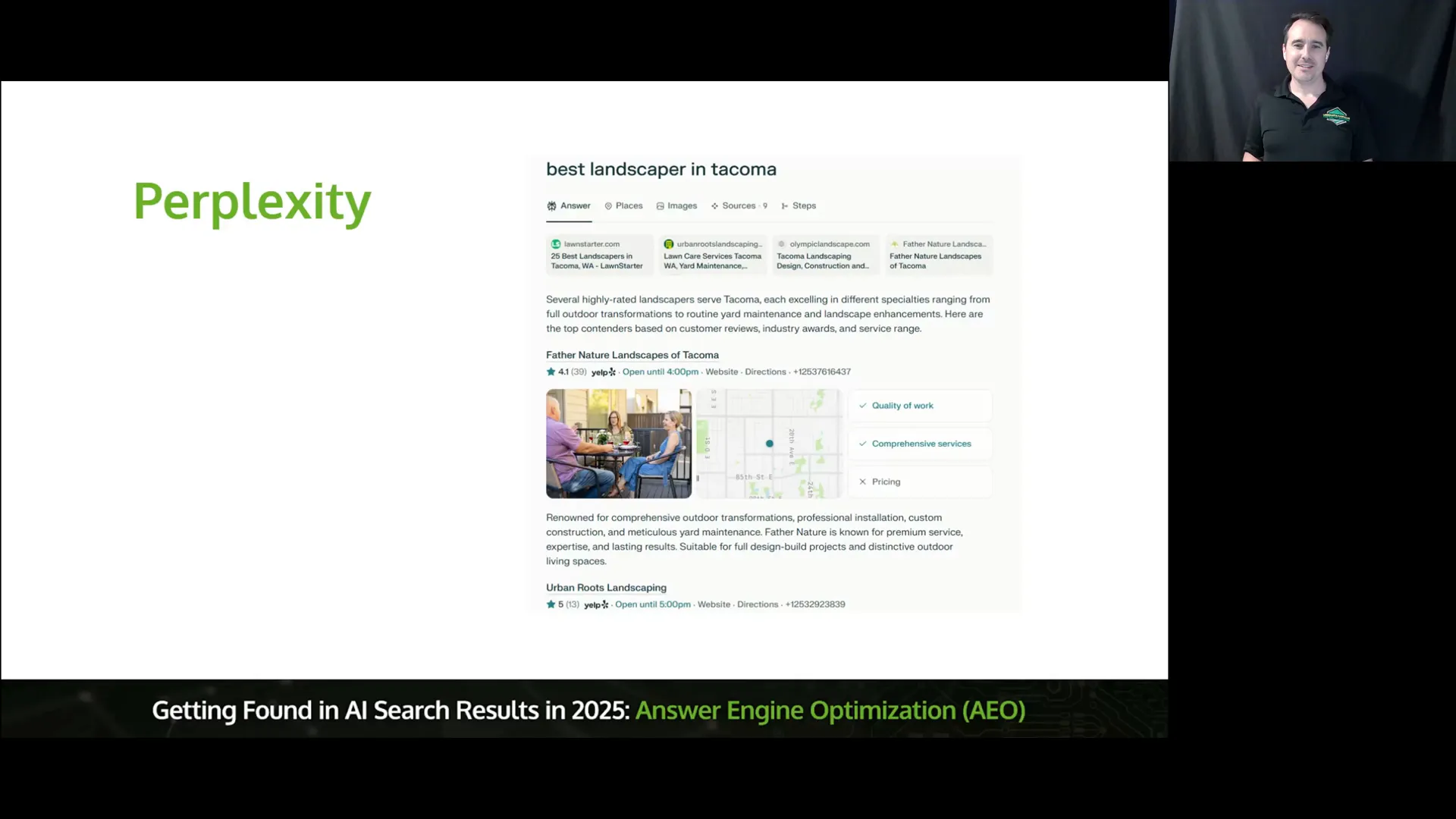
From a landscape marketing standpoint, you must ensure the answers an AI would use are available, accurate, and competitive. That includes FAQ sections, project pages, and easily scannable details (services offered, service area, specialties, reviews, and contact info).
Branding and Its Importance in AI Search
Branding is the bridge between traditional marketing and the new reality of AI-driven search. When an AI is collecting information about businesses, it looks for repeatable patterns and unique claims. If you want AI to select your company in its answer, you must present a clear, differentiated brand across multiple touchpoints.
Elements of brand clarity for landscape marketing:
- Clear statement of who you serve: service area, homeowner vs. commercial, types of properties
- What you do: list core services (hardscape, softscapes, irrigation, outdoor kitchens, lighting, maintenance)
- What makes you different: free on-site consultations, family-owned, X years in business, specialty materials or warranties
- Consistent brand language: the same descriptors used across website, social profiles, directory listings, citations, and press
Here’s a practical test: open your Google Business Profile, Yelp listing, and your homepage. Does the phrase that best defines your brand (e.g., “family-owned custom hardscape contractors serving Tacoma”) appear in multiple places? If not, update them. Repeatability helps AI identify your unique selling proposition.
“What can you say that your competitors can’t say?” — Alex Hormozi (paraphrased)
This quote is especially relevant — for landscape marketing, being able to answer that question with specific, verifiable claims (years in business, trade memberships, distinctive processes) will make AI pick you more confidently.
The Role of Listings and Reviews: Your Reputation System
When AI answers a local query, it often pulls from directory listings and reviews. That is why listings (citations) and reviews are now central to AEO for landscape marketing. Think of directories and reviews as the distributed evidence AI uses to justify presenting your business.
Key listings to control and optimize:
- Google Business Profile (GBP) — still the primary local signal and often the first reference in AI answers
- Bing Places — important because some AI models use Bing search results; you can sync Bing Places with your GBP
- Yelp — referenced by Apple Maps and some AI assistants
- Better Business Bureau (BBB) — good to claim the free listing and show accreditation if applicable
- Angi/HomeAdvisor and Houzz — industry directories that AI references for contractors
- Nextdoor and Reddit — neighborhood and forum mentions are increasingly used as social proof in AI answers
- Industry-specific directories — Launch Data and local trade association directories help build contextual relevance
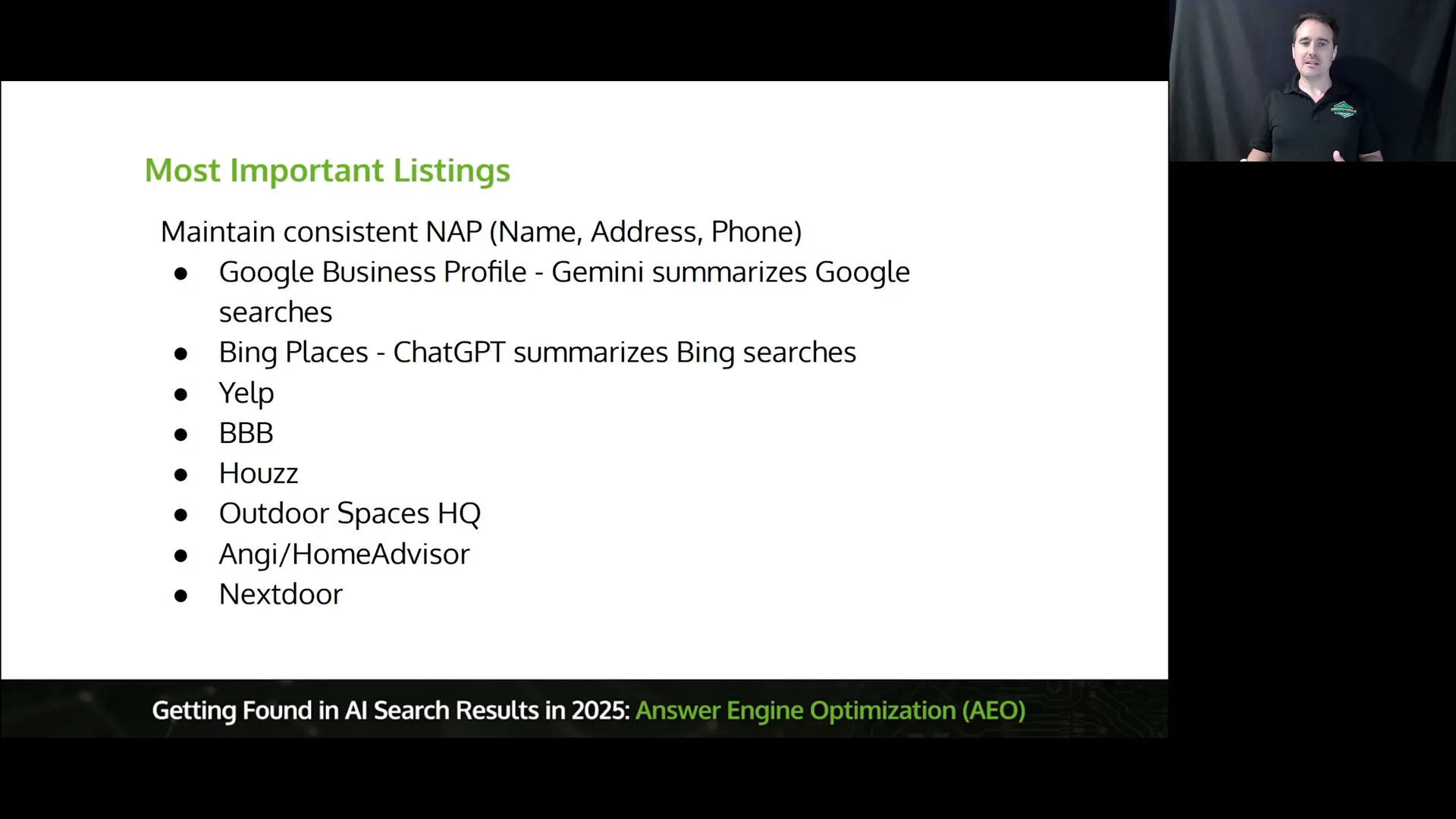
Checklist: Make sure your Name, Address, and Phone number (NAP) are identical across all listings. Slight variations (Inc., LLC, abbreviations, different phone formats) cause AI to treat entries as distinct entities and reduce your trust score. For a focused landscape marketing push, prioritize GBP, Bing Places, Yelp, and at least two industry directories.
Review Strategy for AEO
Reviews are more than just testimonials; they are data points AI uses to evaluate reputation. Here’s how to build a review strategy that helps your landscape marketing efforts:
- Create an exceptional customer experience — the fundamentals still matter. Do great work, show up on time, and communicate clearly.
- Ask for reviews after project completion — explicitly ask clients to leave a review on Google, and if possible, on Yelp, Houzz, or Angi.
- Encourage mentions on neighborhood forums — ask satisfied customers to post on Nextdoor or mention you in local Facebook groups.
- Invite customers to post photos and details — AI values descriptive, unique content (images, project specifics) over one-line praise.
- Replicate reviews across platforms where appropriate — getting reviews on multiple platforms increases the odds AI will cite you.
Reddit and Nextdoor mentions are especially valuable because AI models ingest content from those community-driven platforms and treat them as candid endorsements. If you can earn a few credible mentions in local threads, it will help your landscape marketing authority.
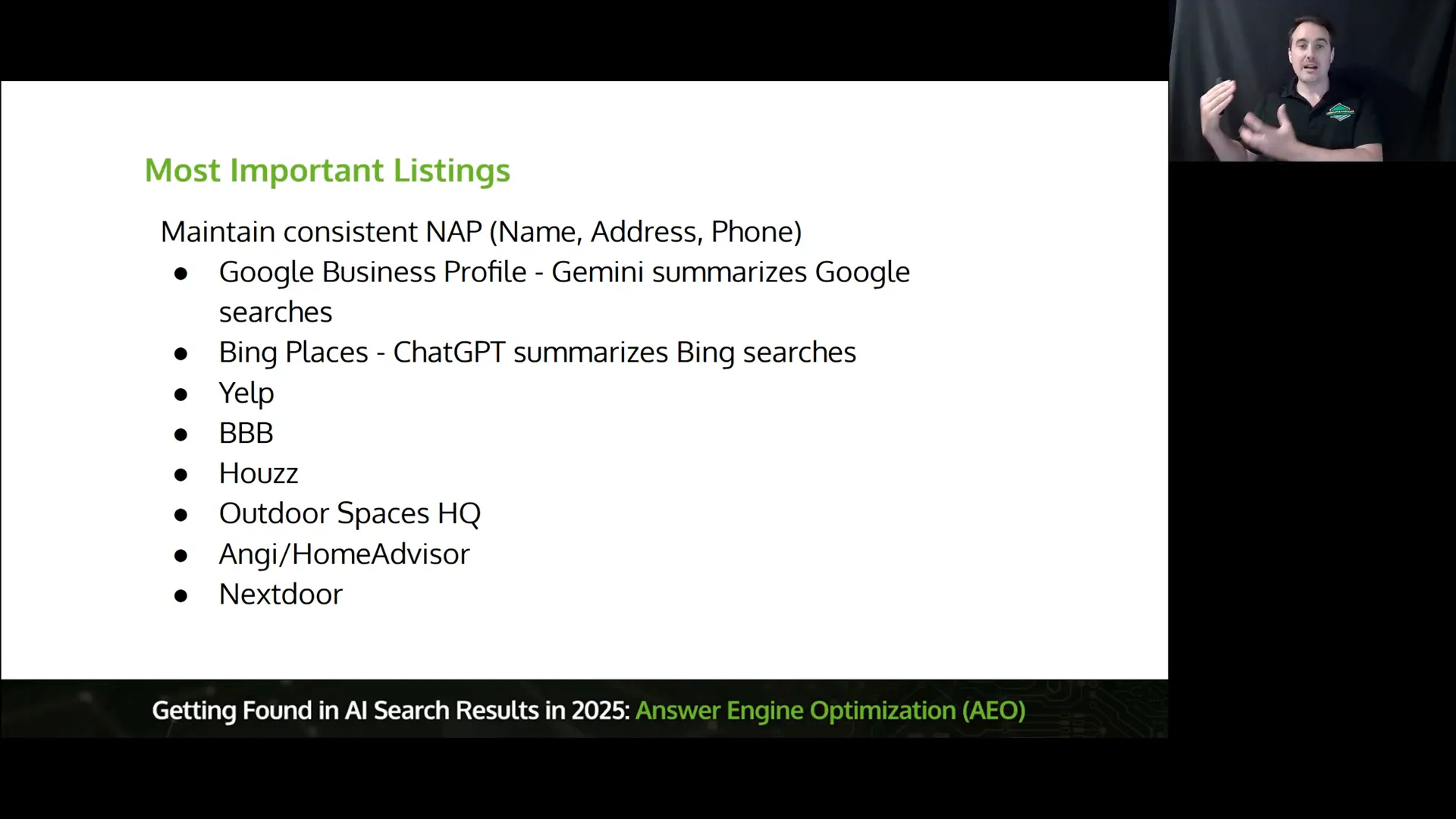
Website Optimization for AI Search: SEO Meets AEO
Your website remains the single most important owned asset for landscape marketing. However, to be useful for AI, it must be built with both classic SEO and modern AEO considerations. That means clear content structure, lots of localized and service-specific pages, schema (structured data), and real project stories.
On-Page SEO & AEO checklist:
- Service pages: Create a detailed page for each core service (patios, retaining walls, irrigation, lighting, maintenance).
- Location pages: Build pages for each city, neighborhood, or service area. Include local landmarks or neighborhoods if applicable.
- Project pages: Publish individual project pages with photos, scope of work, materials used, budget range, and timeline.
- FAQ pages: Publish a concise FAQ covering common buyer questions (consultation cost, lead time, permits, warranties).
- About page: Tell your origin story, years in business, team bios, licenses, trade association memberships (this builds trust signals).
- Contact information: Make contact info easy to find and consistent with your listings.
- Calls to action: Make it easy to book free consultations or request estimates (AI often references whether you offer a free consult).
Project pages are particularly valuable for landscape marketing. They give you a chance to include narrative content that AI can use — “installed 500 sq ft bluestone patio using X brand paver, completed June 2024, client needed ADA access path and integrated lighting” — that specificity helps the model categorize and recommend your work.
Schema Markup: Why Structured Data Matters
Schema markup (structured data) helps AI and search engines understand the meaning of your content. Add schema for your organization, local business, service, products, and projects. A proper schema tells AI that a page describes a contractor service, a completed project, or a review, and it increases your chances of being cited accurately.
Practical schema tips for landscape marketing:
- Apply the Organization and LocalBusiness schema across your site so AI sees you as a legitimate business entity.
- Use the Service schema to describe each service page.
- Consider the Project schema for your showcase project pages.
- Use the Review schema for testimonial pages where you have explicit permission to display reviews.
Run a schema checker after implementing tags. Many SEO tools will highlight missing or malformed structured data. Doing this foundational work boosts how confidently AI will reference your site.
The Rise of Short-Form Video in Search (AEO’s New Frontier)
One of the fastest shifts I’m seeing in landscape marketing is the inclusion of short-form video in search results. Search engines are now surfacing short clips from Instagram Reels, TikTok, YouTube Shorts, and even videos embedded on websites. If you aren’t investing even a small amount of time into short video, you’re missing an increasingly visible signal.
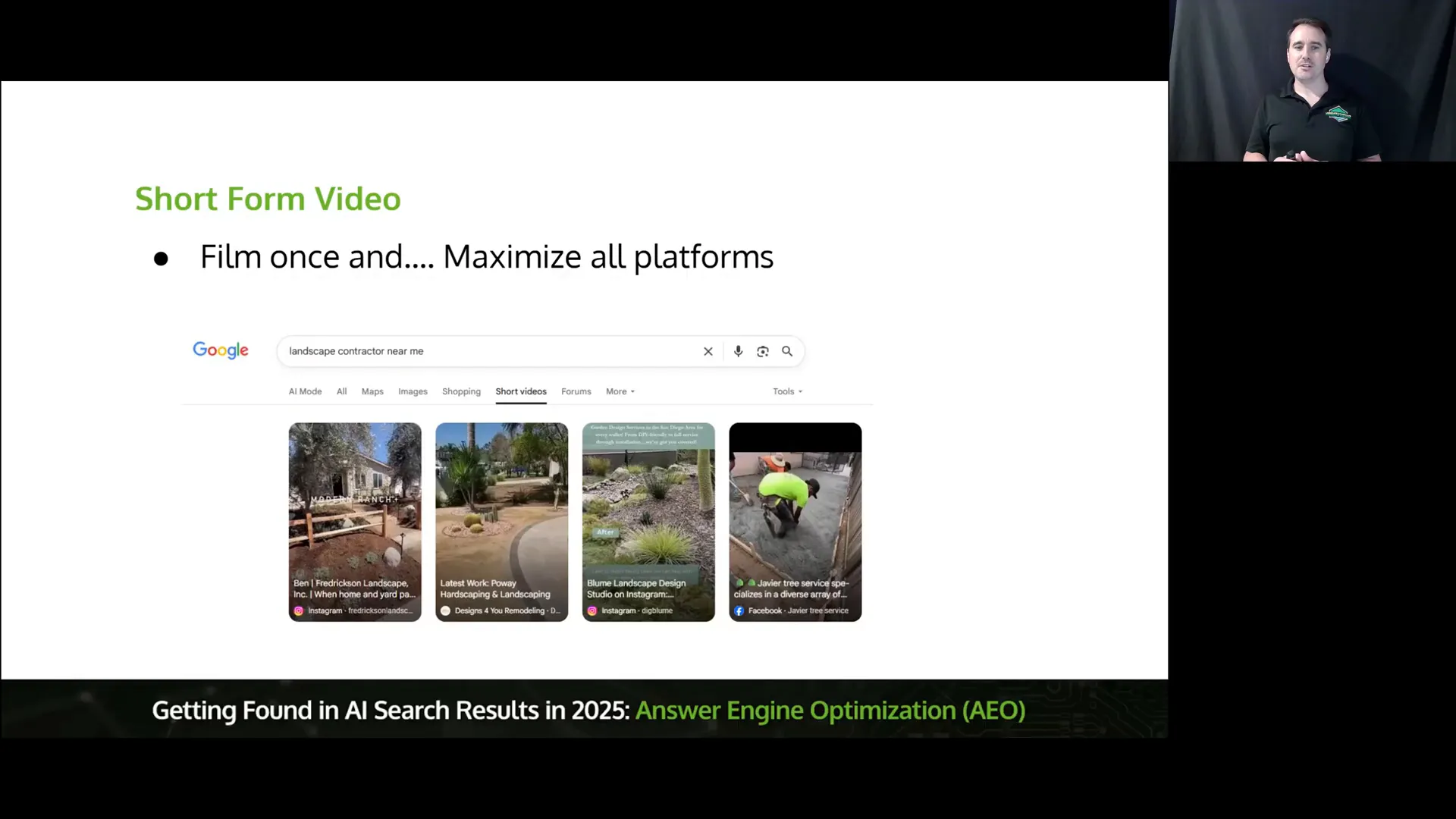
Why short-form video helps AEO:
- Video is engaging and explains services in 30–90 seconds — perfect for busy decision-makers.
- AI often displays a short video carousel or thumbnails directly in the search results page (desktop and mobile).
- Short video content can be repurposed across platforms — record once, publish many places.
- Video captions and on-screen text provide another layer of searchable content for AI to parse.
Short-form content ideas that map directly to landscape marketing and AI visibility:
- Project before-and-after clips with captions describing the scope and materials.
- Quick 60-second explainer videos on common questions (e.g., “How long does a patio take?” or “When should I water my lawn in summer?”).
- Client testimonial clips recorded on-site.
- Behind-the-scenes process footage showing craftsmanship and safety practices.
- Homeowners appreciate short maintenance tips or seasonal checklists.
Distribution strategy: publish your short videos to YouTube Shorts, Instagram Reels, TikTok, and Facebook. Also embed high-performing short videos on project pages. When AI scrapes the web, it will pick up multimedia signals alongside text and citations — a significant advantage for your landscape marketing.
Putting It Together: A Practical 9-Step Action Plan for Landscape Marketing and AEO
Below is a nine-step plan that combines everything in this guide into practical weekly and monthly tasks. If you follow these, you’ll be well-positioned to win AI-driven local referrals and organic leads.
- Claim and Optimize Core Listings (Week 1–2): Google Business Profile, Bing Places, Yelp, BBB, Houzz/Angi. Ensure NAP consistency.
- Audit and Standardize Brand Messaging (Week 1–3): Define your “what, who, why” statement and add it to your homepage, about page, GBP description, and social bios.
- Publish Location & Service Pages (Month 1–2): Build or refresh pages for each city/neighborhood and each service. Add project examples and pricing ranges.
- Schema & Technical SEO (Month 1): Implement organization, local business, service, project, and review schema—test using schema checkers.
- Review & Reputation Campaign (Ongoing): Ask for Google reviews and request additional reviews on Yelp, Houzz, and Angi. Encourage Nextdoor mentions.
- Short Video Content (Ongoing): Start with two short clips per project: a 30–60 second before/after and a 60–90 second FAQ/explainer per month.
- Off-Page Link Building (Months 2–4): Join trade associations, get press releases for notable projects, and get directory backlinks from relevant sites.
- Monitor AI Mentions & Citations (Ongoing): Use alerts and manual checks to find forum mentions, Reddit threads, and aggregated citations. Respond where appropriate.
- Track & Iterate (Monthly): Review lead sources, which AI platforms cite you, and which pages are getting traction. Refine content and video focus accordingly.
This plan is meant to be staggered: you can begin with listings and messaging while building out pages and video content. The goal is to create multiple, consistent signals AI can cite when recommending your business.
Examples and Real-World Scenarios
Here are a few short scenarios that show how AEO plays out in the wild and how landscape marketing choices can change outcomes.
Scenario 1 — The Free Consult Advantage
A homeowner asks, “Who offers free on-site landscape consultations in Tacoma?” If your GBP, homepage, and a service page all say “free on-site consult” with matching phrasing, AI is more likely to include you. If competitors don’t state it, they won’t be cited. A single, clear, repeatable claim can win you a recommended spot.
Scenario 2 — Short Video Beats Static Pages
A prospective client searches from a mobile phone and sees a short video of a patio project in the search results. The video shows the before/after and a quick caption, “Installed a 450 sq ft bluestone patio.” The homeowner watches, gets confident, and calls — bypassing a deeper website search. This is why short video is now a conversion tool for landscape marketing.
Scenario 3 — Forum Mentions Influence AI Answers
A local Reddit thread praises a contractor for quick turnaround and responsiveness. AI models detect multiple positive mentions across Reddit and Nextdoor and will include the contractor in their answer. That forum mention becomes a credibility multiplier if you also have good reviews and a strong GBP.
Measurement: How to Know AEO Is Working
Unlike classic SEO, where rankings are the primary metric, AEO requires broader measurement. Here are the key metrics to track for landscape marketing success with AI-driven search:
- Number of AI citations: how often AI tools reference your business (requires manual checks or third-party tools)
- Leads from organic sources: phone calls, contact form submissions, and booked estimates attributed to organic search
- Profile views and direction requests from GBP and Bing Places
- Volume and velocity of reviews across platforms
- Video views and engagement across Shorts/Reels/TikTok
- Referral traffic from directories and local forums
Track trends month-to-month. If short video views and GBP profile searches increase, but leads remain flat, test stronger CTAs in your videos and clearer “book a free consult” flows on your site.
Common Mistakes to Avoid
Many businesses make these common errors that weaken their landscape marketing and AEO performance:
- Inconsistent NAP across directories — minor differences cause AI confusion.
- Hiding unique claims only in offline materials — make them visible online.
- Relying on one channel (only Google or only Facebook) — AI needs distributed signals.
- Not using schema — structured data dramatically reduces ambiguity.
- Neglecting short video — missing low-hanging visibility in modern search results.
Tools and Resources I Recommend
For landscape marketing and AEO, you’ll want a mix of content tools, listing management, and monitoring.
- Google Business Profile — primary control panel for local presence
- Bing Places — sync with GBP for Windows and Microsoft ecosystem exposure
- Yelp, BBB, Angi, Houzz — claim and optimize industry sites
- Perplexity, ChatGPT, Gemini — use these to see how your business appears in AI answers
- Schema validators — to check structured data on your pages
- Basic video tools — smartphone, simple gimbal, and free editing apps to produce short-form clips
- Monitoring tools — Google Alerts, social listening for Reddit and Nextdoor mentions
Conclusion: Start Small, Build Consistency, Play the Long Game
AI is not a silver bullet — it’s an amplifier for businesses that have done the basics well and layered on clear branding, consistent listings, and content that answers customers’ questions. For landscape marketing, that means focusing on the fundamentals while also creating the distributed signals AI looks for: consistent NAP across directories, repeatable brand messages across web and social, structured data on your website, and short-form video content that demonstrates your work.
If you take away one thing, let it be this: build a system. One consistent claim backed by reviews, project pages, video, and directory citations will give AI the confidence to recommend your business. Start by optimizing your GBP, then publish clear service and project pages, gather reviews on multiple platforms, and begin capturing short project videos. Over time, these coordinated signals will grow your visibility and leads.
FAQs — Answering the Most Common Questions About AEO and Landscape Marketing
Q: What is Answer Engine Optimization (AEO) and how does it differ from SEO?
A: AEO (Answer Engine Optimization) focuses on making your business the preferred answer source for AI-driven search platforms. While SEO optimizes your website for search engine rankings, AEO optimizes your broader digital footprint — listings, reviews, forum mentions, structured data, and multimedia — so AI assistants confidently cite and recommend you. In practice, AEO builds on SEO but extends into reputation, distributed content, and structured metadata.
Q: Which listings should I prioritize for landscape marketing?
A: Start with Google Business Profile and Bing Places, then claim Yelp, BBB, Angi/Houzz, and industry-specific directories like Launch Data. Also, cultivate presence or mentions on Nextdoor and Reddit. These combined listings create the distributed evidence AI relies on when picking recommendations.
Q: How critical are reviews for being found in AI answers?
A: Extremely important. Reviews act as social proof and are often cited by AI models. Aim for consistent, descriptive reviews on Google and at least two other platforms (Yelp, Angi, Houzz). Encourage customers to mention specifics about services and outcomes to make reviews more useful for AI.
Q: Do I need to publish a short-form video? How much effort is required?
A: Yes, short-form video is increasingly visible in search results and is a high-impact way to communicate credibility quickly. Start small: shoot a few 30–90 second clips per project. Repurpose clips across YouTube Shorts, Instagram Reels, TikTok, and Facebook. You can create meaningful content without huge budgets — use a smartphone, decent lighting, and captions.
Q: What role does schema play in AEO?
A: Schema (structured data) helps AI and search engines understand your page content. Use LocalBusiness, Service, Project, and Organization schema to reduce ambiguity. Proper schema increases the likelihood that AI will interpret your content accurately and cite it as a source.
Q: How often should I update listings and content?
A: Regular maintenance is essential. Check core listings quarterly for NAP consistency. Publish new project pages and videos monthly if possible. Respond to reviews promptly and maintain a regular content rhythm so AI sees active, current signals from your business.
Q: Can small landscape contractors compete with larger firms in AEO?
A: Absolutely. A thoughtfully consistent local strategy often beats bigger budgets. Focus on clear, repeatable claims (free consults, quick estimates, specialty work) and cultivate reviews and neighborhood mentions. AI will favor small contractors who do the basics well and show real project detail for local recommendations.
Q: How will I know AI is starting to cite my business?
A: Monitor conversational agents and research tools (Perplexity, ChatGPT with browsing, Gemini) by querying for local recommendations and seeing if your business appears in the citations. Track increases in GBP profile views, referral traffic from directories, short video views, and organic leads attributed to search. Over time, you’ll see trends that indicate AI attention.
Final Checklist: 15 Quick Wins for Landscape Marketing and AEO
- Claim and optimize Google Business Profile and Bing Places
- Standardize NAP across directories
- Publish dedicated service pages with local intent
- Create project pages with scope, materials, and before/after photos
- Implement schema markup for LocalBusiness, Service, and Project
- Ask for Google reviews and diversify review platforms (Yelp, Angi, Houzz)
- Encourage neighborhood mentions on Nextdoor and Reddit
- Produce 30–90 second short-form videos per project
- Embed short videos on project pages and share across platforms
- Join at least two industry directories and local trade associations
- Use consistent brand language across the website, listings, and social media
- Publish seasonal FAQs and answer common customer inquiries
- Monitor AI results and iterate on content where you’re missing citations
- Track leads by source and adjust tactics monthly
- Create a repeatable process for capturing reviews and video at project close.
If you focus on these actions and create consistent signals across your digital footprint, you’ll be prepared for AI-driven search while continuing to benefit from classic SEO tactics. Landscape marketing today is about being discoverable, credible, and visible across many channels — and ensuring the AI assistants people use have reliable, repeatable information to cite.
Thanks for taking the time to read this guide. If you’d like a tailored audit or help putting a strategy into action for your landscape marketing, schedule a discovery call, claim your directory listing, or grab practical marketing resources that walk through the steps in detail. Build the system, not just a page, and you’ll see the difference in leads, reputation, and long-term growth.





